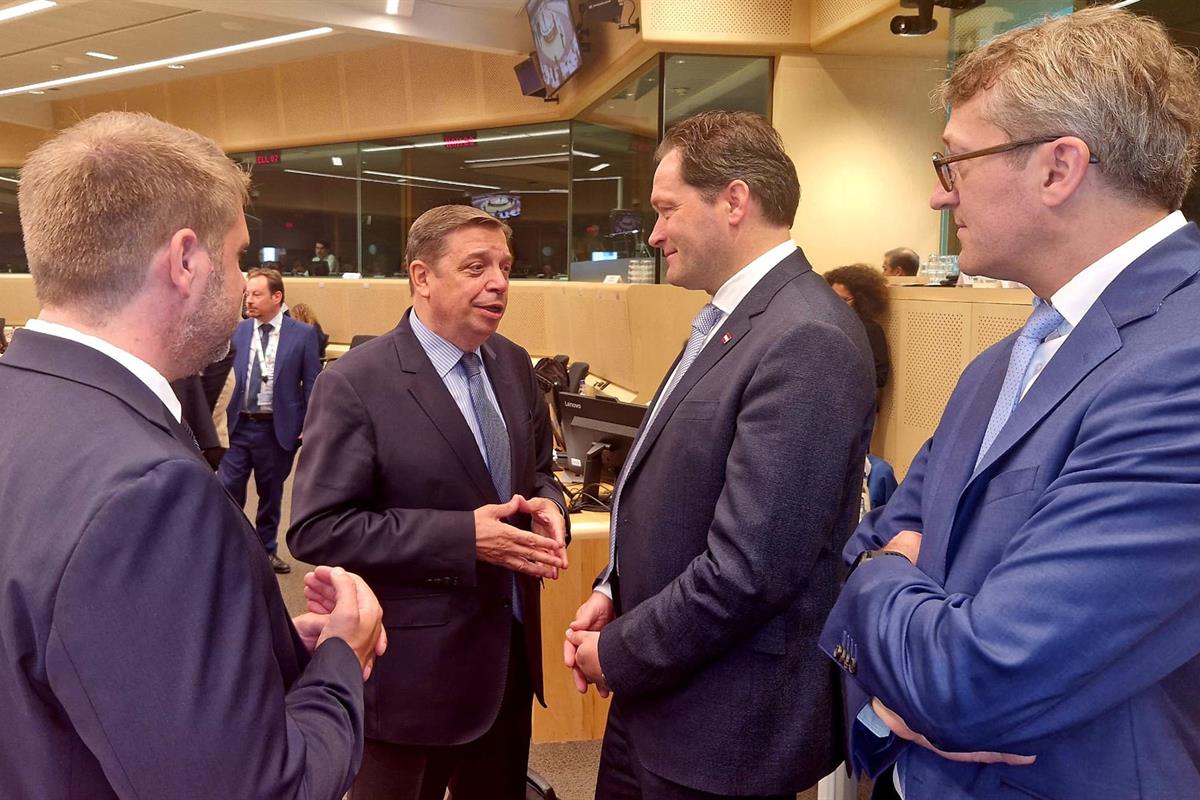European Council of Agriculture Ministers
Luis Planas praises the EU's speed in approving CAP flexibilities and calls for progress on new measures
News - 2024.5.27
 The Minister for Agriculture, Fisheries and Food, Luis Planas, attends the European Council of Agriculture Ministers
The Minister for Agriculture, Fisheries and Food, Luis Planas, attends the European Council of Agriculture Ministers
The Minister for Agriculture, Fisheries and Food, Luis Planas, has today highlighted the speed with which the European institutions have approved the flexibility and simplification measures for the Community Agricultural Policy (CAP) to respond to the concerns expressed by farmers and stockbreeders in some twenty Member States, and which, thanks to this speed, will be effective this year.
The minister recalled that in February, he and his colleagues from other member states had called for easing measures, a response that had been swift. On 15 March the European Commission presented its proposal in response to these requests, which included a large part of the Spanish requests. On the 26th of the same month, the Council of Ministers approved them and on 24 April, the European Parliament approved them, and finally, on Friday 24 May, they were published in the Official Journal of the European Union (OJEU).
Together with this recognition, Planas insisted on the need to make progress on other flexibility measures also demanded by Spain, such as the non-obligatory requirement for geotagged photos, during the Council of Agriculture Ministers held today in Brussels.
In this sense, the minister has considered the proposal to amend the basic regulation of the CAP, which was submitted last Friday by the Commission to be analysed in the CAP Committee on 5 June, in which the obligation for the Member States to use geotagged photos is eliminated. This tool, which monitors the conditions of farms in order to receive subsidies, implies a very high administrative burden for farmers. With the Commission's proposal, Member States will decide whether or not they want to make use of this system and within what timeframe.
Among the possible new flexibilities to be adopted, the minister defended the simplification of measures to promote wine in third countries. The excessive complexity of the current ones makes it an under-utilised instrument, yet it is essential for opening up new markets.
The wine sector was also the subject of the minister's intervention in the debate on trade issues and the market situation in the Council, in which he considered it necessary for the Commission to implement flexibilities in the vineyard authorisation system, such as deferrals, as has been done in previous years.
Planas explained that some wine categories are affected by a high level of stocks, a low level of consumption and a certain slowdown in exports. For this reason, he considered it advisable to activate measures such as green harvesting and distillation, which some autonomous communities are demanding.
Agricultural Reserve Fund
The ministers also discussed the CAP's agricultural reserve fund, currently set at 450 million euros, which, according to Planas, is barely enough to act in certain market situations, and even less so when those that are not used cannot be carried over from one year to the next. Planas has advocated the need to set up a European fund to deal with crisis situations such as those caused by drought or geopolitical conflicts.
According to Minister Planas, one of the issues currently pending with the European Union is the adoption of a regulation to promote the application of new genomic techniques in agriculture. Progress was made on this issue during the Spanish presidency of the Council in the second half of 2023, but it is still pending. Planas insisted that this is a matter of some urgency, as many of the EU's competitors have already adapted them in their production and will make the agricultural sector more competitive.
At today's Council meeting, Spain supported Germany's initiative in favour of a regulation on labelling the origin of foodstuffs, an identification that, according to Planas, will lead to greater transparency for citizens, as well as being an element that enhances the value of production, and the minister specifically called for this to be introduced as soon as possible for rice and pulses.
Non official translation




